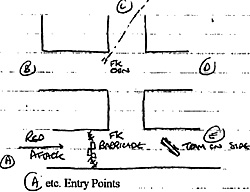 In the year following her defeat in the Great War, Germany collapsed as a nation state. Following mass strikes and general unrest, the country was thrown into political turmoil upon the abdication of the Kaiser. Hurried demobilisation left the country with practically no standing army left to deal with the Polish invasion of Silesia or civil insurrection in the streets of German cities. As the wind of revolution was sweeping through Eastern Europe borne on the sabres of a hundred thousand Red Cavalry, the International Communist League, known as the Spartacists, felt the time was ripe to make a putsche for power.
In the year following her defeat in the Great War, Germany collapsed as a nation state. Following mass strikes and general unrest, the country was thrown into political turmoil upon the abdication of the Kaiser. Hurried demobilisation left the country with practically no standing army left to deal with the Polish invasion of Silesia or civil insurrection in the streets of German cities. As the wind of revolution was sweeping through Eastern Europe borne on the sabres of a hundred thousand Red Cavalry, the International Communist League, known as the Spartacists, felt the time was ripe to make a putsche for power.
In this time of crisis the politicans turned to the bands of unemployed soldiers or other servicemen crowding the cities. These veterans formed 'volunteer' Freikorps under the aegis of charismatic or forceful leaders, many of whom would later play an important part in the rise of the Nazi party.
The most famous Freikorps was formed at the German naval base in Wilhelmshaven by Hermann Ehrhardt, former commander of the 9th Torpedo Flotilla. The so-called Brigade Ehrhardt was comprised of naval officers, petty officers and idealistic student volunteers who found themselves tasked with putting out the flames of insurrection in Kiel, Berlin and Munich. all in quick succession. The 'liberation of Munich lasting from May 30th to April 2nd 1919.
Mathew Sparkes sent me two pages of notes and diagrams for recreating games from the Spartakist Revolt, torn out of a reporters notebook. He`d thrown these together after reading Chris Scruton`s letter in Gauntlet 12. Simple but extremely effective, I think this is a clear example of how to create a fun evening or two`s entertainment with just a little inspiration and a few basic ideas to go on. This is especially true when the period in question is not mainstream and so may not be worth dwelling for too long over.
Two sources worth looking for the Reichswehr in 1919-21 are Militaria Magazine No. 19 September 1995 and Military Illustrated No.50 July 1992.
Bürgerkrieg
 The street fighting between the Freikorps loyal to the fledgling Weimar government and the Spartakist revolutionaries was bitter. The streets of Berlin, Dresden, Leipzig, Halle and Munich amongst others resounded to the sounds of battle as stormtroopers aided by armoured cars, ex-British tanks and flame-throwers 'liberated' street corner after street corner. The Germans would call it Bürgerkrieg or "City War".
The street fighting between the Freikorps loyal to the fledgling Weimar government and the Spartakist revolutionaries was bitter. The streets of Berlin, Dresden, Leipzig, Halle and Munich amongst others resounded to the sounds of battle as stormtroopers aided by armoured cars, ex-British tanks and flame-throwers 'liberated' street corner after street corner. The Germans would call it Bürgerkrieg or "City War".
Bearing this in mind, I saw the Spartacist Revolt as more of a fight for the streets themselves, than battling away from house to house, room to room. The idea of small knots of men huddling in doorways, using shop fronts for cover and turning every street corner into a bastion was far more appealing. Mathew based his game on FULL METAL EDNA from G1. (still a few copies left at £ 1.75 including postage) Deciding once again to use Von EDNA only this time I think it should be called the PUTSCH Factor. Every action and reaction being measured against the amount of Putsch each individual or group of men have.
Obviously the stormtroopers of the Freikorps replaced our USMC chums whilst the Spartakists replaced the VC.
Weapons can be traded off too. An M60 = an LMG, but these were rare, so why not a Bergmann SMG if you shorten it`s range. M79 = Rifle Grenade, Recoilless Rifle on Mule or Jeep = Eckhardt A/c or 75mm infantry gun. The more wicked among you may want to add rules for flamethrowers.
PUTSCH Ratings:
- 7 - Polizei (neither eager nor trained for this sort of thing)
8 - Reds (Spartakists)
9 - Freikorps / Red Sailors
Back to The Gauntlet No. 16 Table of Contents
Back to The Gauntlet List of Issues
Back to Master Magazine List
© Copyright 1999 by Craig Martelle Publications
This article appears in MagWeb (Magazine Web) on the Internet World Wide Web.
Other military history articles and gaming articles are available at http://www.magweb.com